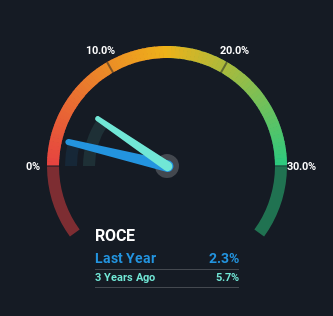The Returns On Capital At Tongkun Group (SHSE:601233) Don't Inspire Confidence
If we want to find a stock that could multiply over the long term, what are the underlying trends we should look for? Firstly, we'll want to see a proven return on capital employed (ROCE) that is increasing, and secondly, an expanding base of capital employed. Ultimately, this demonstrates that it's a business that is reinvesting profits at increasing rates of return. Although, when we looked at Tongkun Group (SHSE:601233), it didn't seem to tick all of these boxes.
What Is Return On Capital Employed (ROCE)?
Just to clarify if you're unsure, ROCE is a metric for evaluating how much pre-tax income (in percentage terms) a company earns on the capital invested in its business. Analysts use this formula to calculate it for Tongkun Group:
Return on Capital Employed = Earnings Before Interest and Tax (EBIT) ÷ (Total Assets - Current Liabilities)
0.023 = CN¥1.3b ÷ (CN¥112b - CN¥53b) (Based on the trailing twelve months to March 2024).
So, Tongkun Group has an ROCE of 2.3%. In absolute terms, that's a low return and it also under-performs the Chemicals industry average of 5.5%.
See our latest analysis for Tongkun Group

In the above chart we have measured Tongkun Group's prior ROCE against its prior performance, but the future is arguably more important. If you're interested, you can view the analysts predictions in our free analyst report for Tongkun Group .
How Are Returns Trending?
In terms of Tongkun Group's historical ROCE movements, the trend isn't fantastic. Around five years ago the returns on capital were 16%, but since then they've fallen to 2.3%. However, given capital employed and revenue have both increased it appears that the business is currently pursuing growth, at the consequence of short term returns. If these investments prove successful, this can bode very well for long term stock performance.
On a separate but related note, it's important to know that Tongkun Group has a current liabilities to total assets ratio of 48%, which we'd consider pretty high. This effectively means that suppliers (or short-term creditors) are funding a large portion of the business, so just be aware that this can introduce some elements of risk. While it's not necessarily a bad thing, it can be beneficial if this ratio is lower.
The Bottom Line
Even though returns on capital have fallen in the short term, we find it promising that revenue and capital employed have both increased for Tongkun Group. In light of this, the stock has only gained 14% over the last five years. So this stock may still be an appealing investment opportunity, if other fundamentals prove to be sound.
Since virtually every company faces some risks, it's worth knowing what they are, and we've spotted 2 warning signs for Tongkun Group (of which 1 is potentially serious!) that you should know about.
While Tongkun Group isn't earning the highest return, check out this free list of companies that are earning high returns on equity with solid balance sheets.
Valuation is complex, but we're here to simplify it.
Discover if Tongkun Group might be undervalued or overvalued with our detailed analysis, featuring fair value estimates, potential risks, dividends, insider trades, and its financial condition.
Access Free AnalysisHave feedback on this article? Concerned about the content? Get in touch with us directly. Alternatively, email editorial-team (at) simplywallst.com.
This article by Simply Wall St is general in nature. We provide commentary based on historical data and analyst forecasts only using an unbiased methodology and our articles are not intended to be financial advice. It does not constitute a recommendation to buy or sell any stock, and does not take account of your objectives, or your financial situation. We aim to bring you long-term focused analysis driven by fundamental data. Note that our analysis may not factor in the latest price-sensitive company announcements or qualitative material. Simply Wall St has no position in any stocks mentioned.
About SHSE:601233
Very undervalued with slight risk.
Market Insights
Community Narratives



